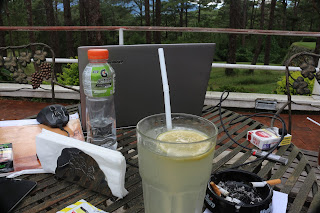Of Millennials, Digital Nomads, and Cottagecore
So there's actually a long backstory to this one.
The penultimate conversation starter to this piece was when I was working on a file which had, among other things, a mother concerned for her son, who, at the age of 25, was still looking for his way and place in the world. I told my best friend about some of the file, whom I was at the cafe working with, and used the word "groundless," as in not belonging anywhere. My best friend and I - we've been friends for more'n two decades - had had our share of groundlessness. So we speculated about this groundlessness, and why it was there.
We recognize our values stemming from our parents and our parents' generation, where work was defined as something more solid and tangible - in terms of outputs, regimented office hours, fixed salaries, uniforms, tenure. That's why we - in the Filipino household context, at least - still think of "proper" jobs as those belonging to doctors, nurses, engineers, policemen. In the silent generation and baby boomer generation mind, especially in our country, hard, honest work is work that is marked by going to an office or an institution, putting in your 9 to 5, and staying there for at least half your life. In the West, though, millennials are displaying values divergent from, and sometimes challenging to, those of previous generations'.
If it is true, as Marx would have it, that man by nature is a working entity, then this shift from the tangible understanding of work to our highly virtual work and world environment impacts what we ourselves value in terms of having a principled life. We millennials - at least in the Philippines - occupy a place where past values and work ethic have been inculcated is us but find more work opportunities in the virtual, rather than the physical, world, which our parents are not very familiar with. This occupation of a transitionary phase leaves us in a bind: Go for work the way our parents defined it and have less and less chances of doing that in this high information age, or go for the values of this high information age and risk being seen as unsuccessful, transient - in other words, groundless.
Groundlessness stems, I think, from this occupation. We feel that we have to be doing something with our lives, but what? The question, if we occupy the transitionary phase between our parents' generation and our own is: In the exponentially myriad things we could do now, in this virtual age, what might pass for solidity, worth, authenticity, realness?
It's no coincidence that cores (cottagecore, grandmacore, fairiecore) or world hashes (domestic cozy, hipster) exist at this time in history. Cottagecore, for example, is "a reaction against capitalism [...] but also related to ongoing interests in wellness and sustainability, and more broadly the idea of social consciousness." (Reggev, 2020). It thrives on what it, admittedly, what it wants to eschew (technology and social platforms), and hearkens back to good ol' English days of agriculture and domesticity. Its values are self-reliance, accomplishment in small things made from your own hands - things our parents themselves valued, making the core itself seemingly romantic and idealized: "While cottagecore could easily be mistaken for an escapist fantasy, its proponents insist it is a form of self-care. Ms. Craft said her interest in cottagecore stems from a desire to self-soothe. 'It’s relieving to come home from a hard day and look at these nice pictures of things that you may not have, that you may never have. It gives you a sense of belongingness.'" (Slone, 2020)
Escapist or not, I find comfort in it. If not for its values, then for its aesthetic - it, to me, is self-care and valuing some things, rather than being lost, groundless, in the transitoriness of history.


Comments
Post a Comment